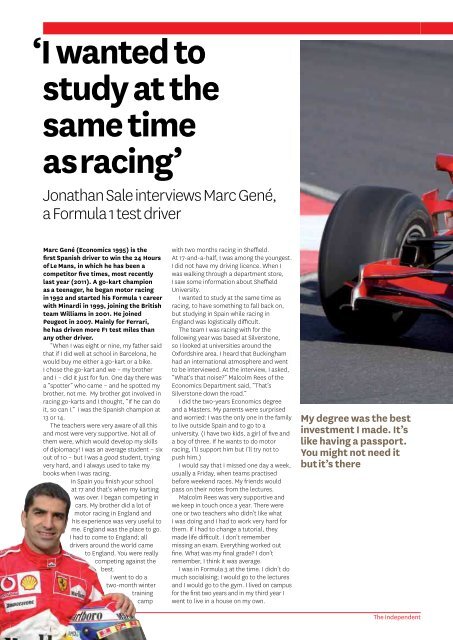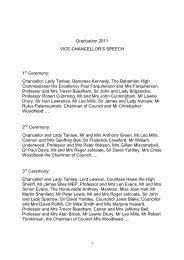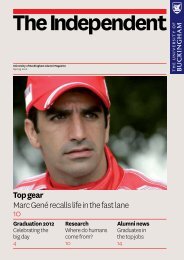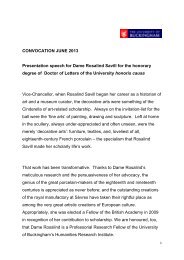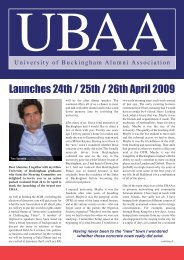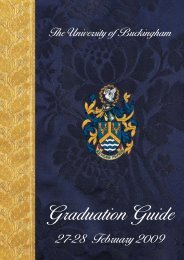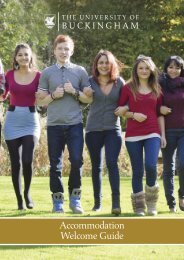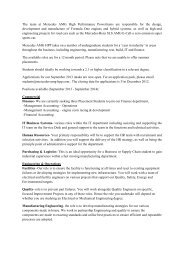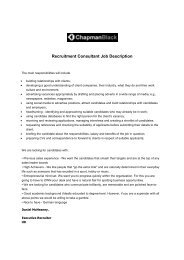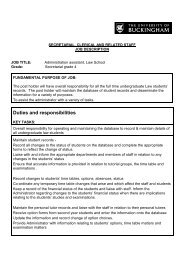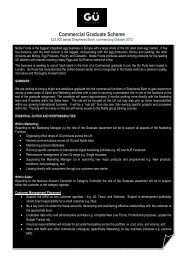Spring 2012 - University of Buckingham
Spring 2012 - University of Buckingham
Spring 2012 - University of Buckingham
Create successful ePaper yourself
Turn your PDF publications into a flip-book with our unique Google optimized e-Paper software.
‘I wanted tostudy at thesame timeas racing’Jonathan Sale interviews Marc Gené,a Formula 1 test driverMarc Gené (Economics 1995) is thefirst Spanish driver to win the 24 Hours<strong>of</strong> Le Mans, in which he has been acompetitor five times, most recentlylast year (2011). A go-kart championas a teenager, he began motor racingin 1992 and started his Formula 1 careerwith Minardi in 1999, joining the Britishteam Williams in 2001. He joinedPeugeot in 2007. Mainly for Ferrari,he has driven more F1 test miles thanany other driver.“When I was eight or nine, my father saidthat if I did well at school in Barcelona, hewould buy me either a go-kart or a bike.I chose the go-kart and we – my brotherand I – did it just for fun. One day there wasa “spotter” who came – and he spotted mybrother, not me. My brother got involved inracing go-karts and I thought, “If he can doit, so can I.” I was the Spanish champion at13 or 14.The teachers were very aware <strong>of</strong> all thisand most were very supportive. Not all <strong>of</strong>them were, which would develop my skills<strong>of</strong> diplomacy! I was an average student – sixout <strong>of</strong> 10 – but I was a good student, tryingvery hard, and I always used to take mybooks when I was racing.In Spain you finish your schoolat 17 and that’s when my kartingwas over. I began competing incars. My brother did a lot <strong>of</strong>motor racing in England andhis experience was very useful tome. England was the place to go.I had to come to England; alldrivers around the world cameto England. You were reallycompeting against thebest.I went to do atwo-month wintertrainingcampwith two months racing in Sheffield.At 17-and-a-half, I was among the youngest.I did not have my driving licence. When Iwas walking through a department store,I saw some information about Sheffield<strong>University</strong>.I wanted to study at the same time asracing, to have something to fall back on,but studying in Spain while racing inEngland was logistically difficult.The team I was racing with for thefollowing year was based at Silverstone,so I looked at universities around theOxfordshire area. I heard that <strong>Buckingham</strong>had an international atmosphere and wentto be interviewed. At the interview, I asked,“What’s that noise?” Malcolm Rees <strong>of</strong> theEconomics Department said, “That’sSilverstone down the road.”I did the two-years Economics degreeand a Masters. My parents were surprisedand worried: I was the only one in the familyto live outside Spain and to go to auniversity. (I have two kids, a girl <strong>of</strong> five anda boy <strong>of</strong> three. If he wants to do motorracing, I’ll support him but I’ll try not topush him.)I would say that I missed one day a week,usually a Friday, when teams practisedbefore weekend races. My friends wouldpass on their notes from the lectures.Malcolm Rees was very supportive andwe keep in touch once a year. There wereone or two teachers who didn’t like whatI was doing and I had to work very hard forthem. If I had to change a tutorial, theymade life difficult. I don’t remembermissing an exam. Everything worked outfine. What was my final grade? I don’tremember, I think it was average.I was in Formula 3 at the time. I didn’t domuch socialising; I would go to the lecturesand I would go to the gym. I lived on campusfor the first two years and in my third year Iwent to live in a house on my own.My degree was the bestinvestment I made. It’slike having a passport.You might not need itbut it’s thereNow people start in motor sport muchyounger. It’s difficult now to go to universitywhile racing; it’s difficult even to finishschool. I don’t remember any drivers whowent to university in the last 20 years.The last one I can remember was JonathanPalmer; he was a doctor. Among thedrivers, there were never any negativecomments about my being universitytrained; people would say it was very good.How has my economics degree beenuseful? Sponsors may ask about theeconomy <strong>of</strong> Formula 1 and I can explainthat Formula 1 runs on the same principlesas any other company.My favourite subject was macroeconomics.I’ve always been interestedin the big picture.There was a Spanish community in the<strong>University</strong> and I still see friends from thattime. In my first two years I was veryfocused and was one <strong>of</strong> the students whowent out least. In my third year I startedto go out more. Graduation was one <strong>of</strong> themost important days <strong>of</strong> my life; MargaretThatcher gave me my degree.You could postpone your military servicewhile you were studying and I did it in 1996as soon as I got back to Spain. I studiedFrench and Italian. (I also speak Catalan,Castilian, English and German.) In 1997 Idid the International F3000 Championshipand in 1998 I won the Open Fortuna byNissan. I wasn’t sure if I was going to makeit to Formula 1. I started sending out CVsto accountancy firms and was selected forPricewaterhouseCoopers and ended upworking for them as an auditor in 1998.Now they are my advisers; they take care <strong>of</strong>the company I use for racing. Finally I madeit to Formula 1 in 1999.Three things stand out in my career.The 24 Hours <strong>of</strong> Le Mans: I’m the first andonly Spanish driver to win that race and theday I won it was a big day in Spain. In futureI’ll look back on it and know that I madesomething big and fulfilled all the years <strong>of</strong>hard work. Then there was the time whenI first signed for Ferrari – I was never aracing driver for them but a test driver –and I put on the Ferrari overalls and joinedthe Ferrari family. And finally, in the history<strong>of</strong> Spain, only ten drivers had made it toFormula 1 before me.Now I have two main incomes: Ferrariand Peugeot. I also am a televisioncommentator in Spain for the F1 races.My aim is to continue with the threecompanies for the next three years sinceI love the work I do with them. Ferrari haveindicated that I could be involved withthem in developing cars.I’m 37 and in Formula 1 that starts to bethe age – Schumacher was the exceptionat 42 – when you are replaced by youngdrivers. My degree was the best investmentI made and I’m so relaxed now. If the racingsuddenly stopped, I would be very relaxed.A degree is like having a passport. You maynot need it but it’s there.The writer is a freelance journalist8 The Independent The Independent 9


